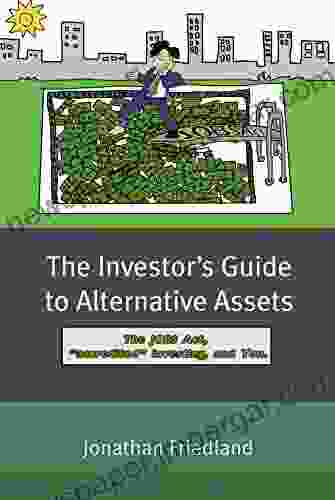Harnessing the Jobs Act: A Comprehensive Guide to Accredited Investing and Its Transformative Impact

The JOBS Act, short for Jumpstart Our Business Startups Act, has revolutionized the investment landscape by opening up exciting opportunities for accredited investors. This comprehensive guide, "The Jobs Act: Accredited Investing and You," unravels the intricacies of this transformative legislation, empowering you with the knowledge to navigate its nuances and leverage its benefits to build a diversified portfolio.
Understanding Accredited Investors
The Securities and Exchange Commission (SEC) defines accredited investors as individuals or entities meeting specific income, net worth, or other criteria. These criteria ensure that investors possess the financial sophistication and understanding to evaluate the risks and rewards associated with private investments made under Regulation D.
4.8 out of 5
| Language | : | English |
| File size | : | 2451 KB |
| Text-to-Speech | : | Enabled |
| Screen Reader | : | Supported |
| Enhanced typesetting | : | Enabled |
| Word Wise | : | Enabled |
| Print length | : | 86 pages |
| Lending | : | Enabled |
Qualifying as an Accredited Investor
- Income: Earn at least $200,000 annual income (or $300,000 jointly with a spouse) for the last two years, with the expectation of continuing to do so in the current year.
- Net Worth: Have a net worth exceeding $1 million, excluding the value of their primary residence.
- Sophisticated Entities: Certain entities, such as registered investment advisers, corporations with more than $5 million in assets, and certain trusts, are automatically considered accredited investors.
Navigating Regulation D
Regulation D provides a framework for private securities offerings that do not require registration with the SEC. Under this regulation, accredited investors enjoy a broader range of investment opportunities compared to non-accredited investors.
Exemptions under Regulation D
- Rule 504: Permits small offerings of up to $1 million.
- Rule 505: Allows offerings of up to $5 million without the requirement of a state-level review.
- Rule 506(c): Enables the broadest offerings, with no limits on the amount raised, but requires a review by the SEC.
Benefits of Accredited Investing
Accredited investing under Regulation D offers numerous advantages, including:
- Diversification: Gain access to a wider array of investment options, including private placements, venture capital funds, and real estate investments, expanding your portfolio's diversification.
- Higher Return Potential: Private investments have historically outperformed public markets, potentially leading to higher returns.
- Investor Control: Accredited investors enjoy greater influence in investment decisions, allowing them to align their investments with their specific goals and values.
- Tax Advantages: Certain investments under Regulation D can offer tax benefits, such as the opportunity to defer capital gains taxes.
Risks of Accredited Investing
While accredited investing provides potential benefits, it is crucial to acknowledge the associated risks:
- Higher Risk: Private investments carry a higher level of risk compared to traditional investments.
- Illiquidity: Private investments are less liquid than publicly traded securities, making it more difficult to access funds.
- Fraud and Misrepresentation: Investors need to exercise due diligence to mitigate the risk of falling victim to fraudulent or misleading investment offerings.
- Regulatory Compliance: Accredited investors must comply with specific reporting and disclosure requirements under Regulation D.
Due Diligence and Investment Strategies
To maximize the benefits of accredited investing while mitigating risks, it is essential to conduct thorough due diligence and adopt sound investment strategies:
Due Diligence
- Investigate Issuer: Conduct research on the company, its management team, and business model.
- Review Offering Documents: Carefully examine the offering documents, including the private placement memorandum.
- Seek Professional Advice: Consult with a financial adviser, attorney, or other qualified professional for guidance.
Investment Strategies
- Diversify Investments: Spread investments across various asset classes and companies to minimize risk.
- Invest with Experienced Sponsors: Partner with reputable investment sponsors who have a proven track record.
- Set Realistic Expectations: Understand the potential risks and rewards associated with accredited investing and set realistic return expectations.
The Future of Accredited Investing
The JOBS Act has catalyzed the growth of accredited investing, leading to the proliferation of new investment platforms and opportunities. As the market continues to evolve, technology and innovation are expected to further enhance the accessibility and transparency of private investments, making accredited investing more accessible and appealing to a broader range of investors.
"The Jobs Act: Accredited Investing and You" provides a comprehensive understanding of the nuances of accredited investing under the JOBS Act. By embracing this guide, you are empowered to harness the transformative opportunities it offers, expand your investment horizons, and potentially enhance your financial well-being. Remember, due diligence, sound investment strategies, and a comprehensive understanding of the risks and rewards involved are key to maximizing the benefits of accredited investing.
Disclaimer: The information contained in this article is provided for informational purposes only and should not be considered investment advice. It is essential to consult with qualified professionals before making any investment decisions.
4.8 out of 5
| Language | : | English |
| File size | : | 2451 KB |
| Text-to-Speech | : | Enabled |
| Screen Reader | : | Supported |
| Enhanced typesetting | : | Enabled |
| Word Wise | : | Enabled |
| Print length | : | 86 pages |
| Lending | : | Enabled |
Do you want to contribute by writing guest posts on this blog?
Please contact us and send us a resume of previous articles that you have written.
 Book
Book Novel
Novel Page
Page Chapter
Chapter Text
Text Story
Story Genre
Genre Reader
Reader Library
Library Paperback
Paperback E-book
E-book Magazine
Magazine Newspaper
Newspaper Paragraph
Paragraph Sentence
Sentence Bookmark
Bookmark Shelf
Shelf Glossary
Glossary Bibliography
Bibliography Foreword
Foreword Preface
Preface Synopsis
Synopsis Annotation
Annotation Footnote
Footnote Manuscript
Manuscript Scroll
Scroll Codex
Codex Tome
Tome Bestseller
Bestseller Classics
Classics Library card
Library card Narrative
Narrative Biography
Biography Autobiography
Autobiography Memoir
Memoir Reference
Reference Encyclopedia
Encyclopedia Jorge Luis Borges
Jorge Luis Borges Joseph S Catalano
Joseph S Catalano John Thompson
John Thompson John Edwards
John Edwards John Haldane
John Haldane John Lothrop Motley
John Lothrop Motley Joseph David Job
Joseph David Job Joseph Story
Joseph Story John Eastman
John Eastman John Flavel
John Flavel John Mosier
John Mosier John Parker
John Parker Jonathan Herring
Jonathan Herring Jonathan Alexander
Jonathan Alexander John Heck
John Heck John Heath
John Heath John Montague
John Montague Johnny Molloy
Johnny Molloy Joseph H Peterson
Joseph H Peterson Jonathan Handel
Jonathan Handel
Light bulbAdvertise smarter! Our strategic ad space ensures maximum exposure. Reserve your spot today!

 Yasushi InoueCenturies of Yesterday, Quatrains of Today: A Literary Tapestry Spanning Time
Yasushi InoueCenturies of Yesterday, Quatrains of Today: A Literary Tapestry Spanning Time Austin FordFollow ·9.5k
Austin FordFollow ·9.5k Kendall WardFollow ·18.8k
Kendall WardFollow ·18.8k Rudyard KiplingFollow ·16.2k
Rudyard KiplingFollow ·16.2k Efrain PowellFollow ·19.2k
Efrain PowellFollow ·19.2k Dakota PowellFollow ·10.5k
Dakota PowellFollow ·10.5k Brady MitchellFollow ·7.8k
Brady MitchellFollow ·7.8k Ian McEwanFollow ·4k
Ian McEwanFollow ·4k Lee SimmonsFollow ·14.5k
Lee SimmonsFollow ·14.5k

 Jake Powell
Jake PowellThe Constitution of the State of Colorado: A Legacy of...
Since its adoption in 1876, the...

 Devin Ross
Devin RossFrom Plato to Plantinga: A Journey Through the History of...
Philosophy is the study of...

 Robin Powell
Robin PowellWords That Hurt, Words That Heal: The Power of Language...
Words are powerful. They can...

 T.S. Eliot
T.S. EliotTantalize Your Taste Buds with Over 90 Low-Carb Ethnic...
Indulge in a Culinary Adventure with "Over...
4.8 out of 5
| Language | : | English |
| File size | : | 2451 KB |
| Text-to-Speech | : | Enabled |
| Screen Reader | : | Supported |
| Enhanced typesetting | : | Enabled |
| Word Wise | : | Enabled |
| Print length | : | 86 pages |
| Lending | : | Enabled |














